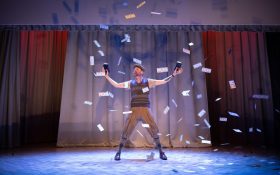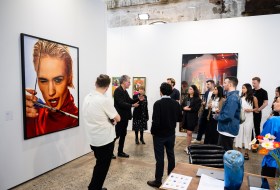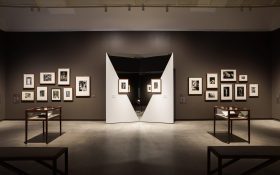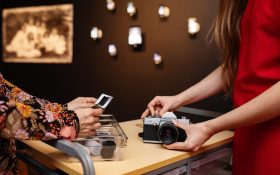Mabo docudrama starring Deborah Mailman has been screened by numerous school groups; Image: supplied.
With audiences living in an increasingly screen-based world, screenings and even shorter content within the exhibition itself are now a common part of art programs.
A screening adds context for the audience, particularly useful for retrospectives or exhibitions where background information on an artist, movement or social issue are valuable for increasing audience understanding.
It also varies the media and gives the audience a chance to sit down and rest – which means they are ready to look at more art.
But before you start planning a screening for your next exhibition, you need to be aware of the opportunities and challenges. To find out more about the process involved, ArtsHub asked Juliet Stuart-Smith, Sales Executive for Programs at ABC Commercial for her advice.
Licensing
Whether you are mounting a short looped video work or presenting an extensive program of film screenings, you will require a license to use material.
Contact the distributor directly to access high-quality, legally cleared material.
In Australia, that is most often the ABC, which is the distributor and rights holder for arguably the largest collection of arts related material. The ABC often receives requests from publishers, galleries, museums and government organisations who want to use archival material or even current programs.
Stuart-Smith said the ABC receives a tremendous range of requests.
‘Curators often want to use the material in different ways. They might be seeking to have a screening to accompany the exhibition, or they might be after a specific bit of material for an interactive display in the exhibition itself – either video or audio,’ she said.
Timing
Think ahead.
Depending on the material you have in mind, it could take a couple of weeks to locate and check rights in the item you requested, especially if it’s something that hasn’t seen the light of day for many years. For non catalogue items, time is needed to check and clear rights, and to draw up the licenses, which need to be specifically tailored to how you will be using the work. The rights become more complex when you wish to edit a completed program.
At the ABC it is possible to identify, digitise and draft a licence for a non catalogue item in two weeks if you have a specific program in mind, but if you do not have the details of the exact excerpts you want, expect longer.
But where possible, contact the ABC at the early stage of planning so there’s enough time to address any tricky rights or format issues that might arise.
‘The time needed varies with each request. Sometimes they know exactly what they want and don’t really need extra things. But sometimes it’s a bit more of a mystery. They might have an artist friend knows such-and-such was interviewed by someone, and they think it was around a particular year but they aren’t quite sure and that will take a bit longer to work out,’ said Stuart-Smith.
‘If people want to come to us and say we are putting an exhibition on this particular subject and we would like to know what content you have on it, we can actually provide those research services. We do charge for that but it is possible.’
Not only is lead time advised to allow for the access and licensing process, but you should also give yourself a few weeks to address any unanticipated technical problems.
Ensure there is technical support for staff
Hopefully the screening will run smoothly – but it might not. One thing people often forget is to ensure the people who will be on site know how to set up and troubleshoot.
If you have volunteers or staff present during the exhibition, provide them with instructions on how to operate the equipment so they know how to deal with problems if they come up during the exhibition hours.
To find out more about the collection held by ABC archives and also its contemporary arts programming visit https://www.abccommercial.com/librarysales/
Add your details to the ABC contacts list to receive updates on the latest activities here https://confirmsubscription.com/h/d/1E1BC9A87B7AF79E





